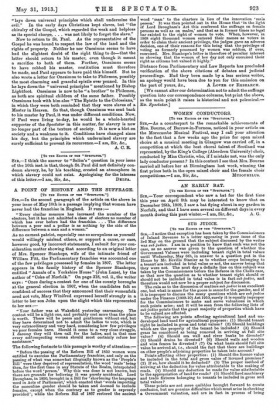A POINT OF HISTORY AND THE SUFFRAGE. [To THE EDITOR
OF TRH "SPECTATOR."] SIR,—In the second paragraph of the article on the above in your issue of May 10th is a passage implying that women have never had the franchise in England. It runs :— "Every similar measure has increased the number of the electors, but it has not admitted a class of electors no member of which has ever before had the franchise.. . . The difference between a peer and a pedlar is as nothing by the side of the difference between a man and a woman."
As no earnest patriot, especially one so scrupulous as yourself would willingly mislead others, or support a cause, or case, however good, by incorrect statements, I submit for your con- sideration matter showing that according to an original letter of Mrs. Spencer Stanhope, wife of the intimate friend of William Pitt, the Parliamentary franchise was accounted one of the few privileges possessed by females in 1807. The letter appears in the family history of the Spencer Stanhopes, entitled " Annals of a Yorkshire House" (John Lane), by the author of "Coke of Norfolk." On page 318, vol. ii., the writer says : "Once during a contest for one of the county boroughs at the general election in 1807, when the candidates felt so confident of success that they announced that their womenfolk need not vote, Mary Winifred expressed herself strongly in a letter to her son John upon the slight which this represented to her sex :— " Your father was at Wakefield yesterday canvassing. The contest will be a light one, and probably cost more than the place is worth. There will be peers and gentlemen without end, but they have determined not to admit the ladies to vote, which is very extraordinary and very hard, considering how few privileges we poor females have. Should it come to a very close struggle, I daresay they will then call for the ladies, and in that case every self-respecting woman should most certainly refuse her assistance."
The following footnote to this passage is worthy of attention :-
" Before the passing of the Reform Bill of 1832 women were entitled to exercise the Parliamentary franchise, and only on the passing of what was somewhat illogically known as the 'People's Bill' were they deprived of representation, the word `male' being then, for the first time in any Statute of the Realm, interpolated before the word 'person.' Why this was done is not known, but there are grounds for believing it was purely accidental. Lord Brougham, in 1850, brought in a Bill for 'shortening the language used in Acts of Parliament,' which enacted that 'words importing the masculine gender should be taken and deemed to include females, except when the contrary as to gender is expressly provided '; while the Reform Bill of 1867 restored the ancient
word ` man ' to the charters in lieu of the innovation 'male person.' It was then pointed out in the House that in the light of Lord Brougham's Act this conferred the suffrage on female persons as well as on males,' and that as in former times no legal bar existed to the right of women to vote. When, however, in 1868 eight thousand women entered their names as voters in order to claim their ancient privilege, the judges gave an adverse decision, one of their reasons for this being that the privilege of voting as formerly possessed by women was seldom, if ever, exercised. Mrs. Stanhope's letter is therefore of peculiar interest as showing that the women of her day not only exercised their right as citizens but valued it highly."
Distance from Parliamentary and Law Reports has precluded verification of the above citations of debates and judicial proceedings. Had they been made by a less serious writer, an apology would have been due to you for this omission on [We cannot alter our determination not to admit the suffrage question into our correspondence columns, but print the above, as the main point it raises is historical and not polemical.— En. Spectator.]


















































 Previous page
Previous page